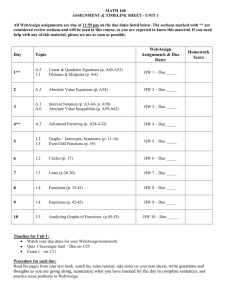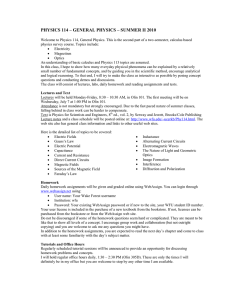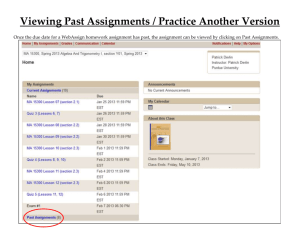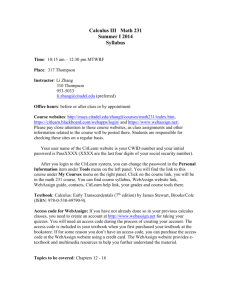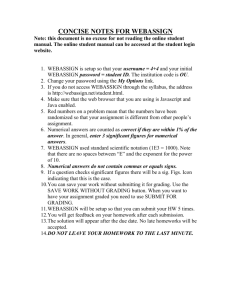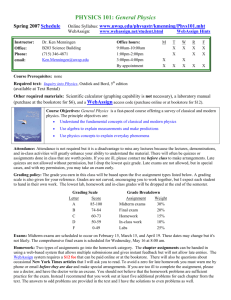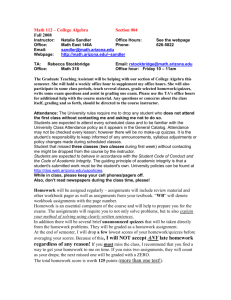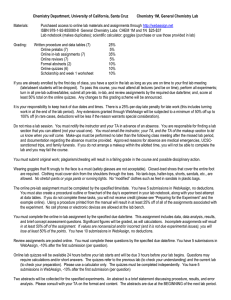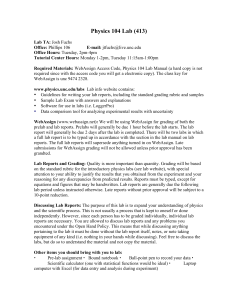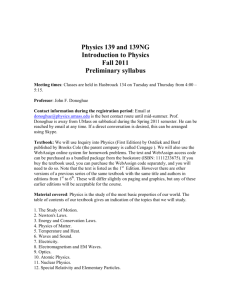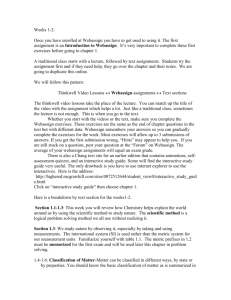PHYSICS 215 Elementary Modern Physics Monday Wednesday
advertisement
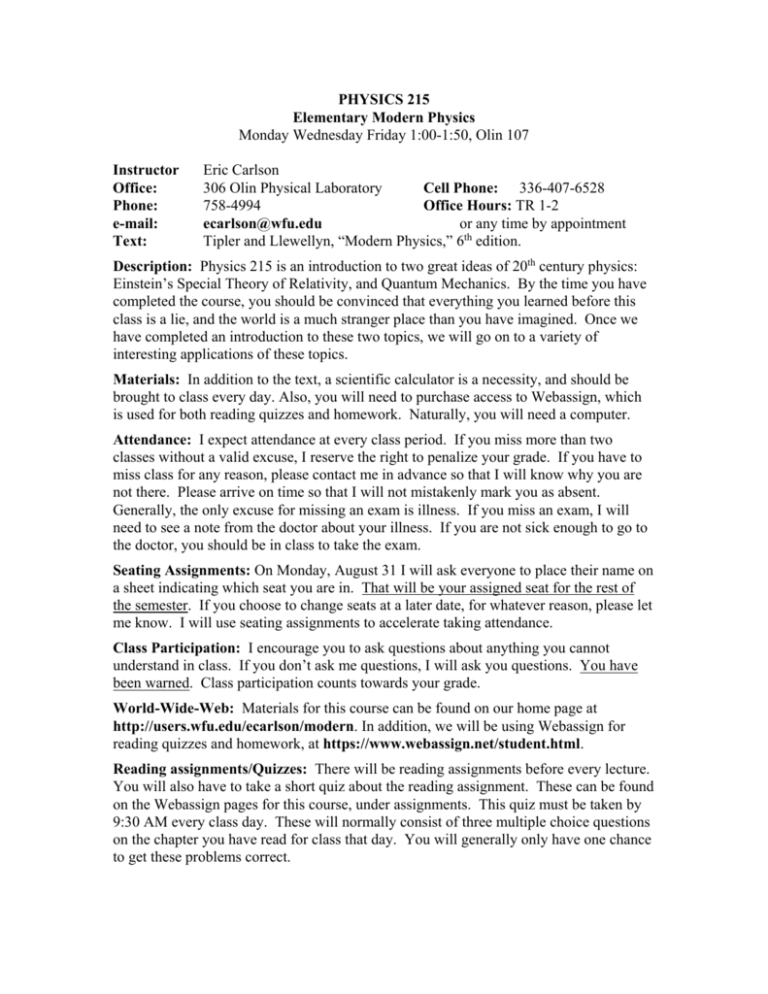
PHYSICS 215
Elementary Modern Physics
Monday Wednesday Friday 1:00-1:50, Olin 107
Instructor
Office:
Phone:
e-mail:
Text:
Eric Carlson
306 Olin Physical Laboratory
Cell Phone: 336-407-6528
758-4994
Office Hours: TR 1-2
ecarlson@wfu.edu
or any time by appointment
Tipler and Llewellyn, “Modern Physics,” 6th edition.
Description: Physics 215 is an introduction to two great ideas of 20th century physics:
Einstein’s Special Theory of Relativity, and Quantum Mechanics. By the time you have
completed the course, you should be convinced that everything you learned before this
class is a lie, and the world is a much stranger place than you have imagined. Once we
have completed an introduction to these two topics, we will go on to a variety of
interesting applications of these topics.
Materials: In addition to the text, a scientific calculator is a necessity, and should be
brought to class every day. Also, you will need to purchase access to Webassign, which
is used for both reading quizzes and homework. Naturally, you will need a computer.
Attendance: I expect attendance at every class period. If you miss more than two
classes without a valid excuse, I reserve the right to penalize your grade. If you have to
miss class for any reason, please contact me in advance so that I will know why you are
not there. Please arrive on time so that I will not mistakenly mark you as absent.
Generally, the only excuse for missing an exam is illness. If you miss an exam, I will
need to see a note from the doctor about your illness. If you are not sick enough to go to
the doctor, you should be in class to take the exam.
Seating Assignments: On Monday, August 31 I will ask everyone to place their name on
a sheet indicating which seat you are in. That will be your assigned seat for the rest of
the semester. If you choose to change seats at a later date, for whatever reason, please let
me know. I will use seating assignments to accelerate taking attendance.
Class Participation: I encourage you to ask questions about anything you cannot
understand in class. If you don’t ask me questions, I will ask you questions. You have
been warned. Class participation counts towards your grade.
World-Wide-Web: Materials for this course can be found on our home page at
http://users.wfu.edu/ecarlson/modern. In addition, we will be using Webassign for
reading quizzes and homework, at https://www.webassign.net/student.html.
Reading assignments/Quizzes: There will be reading assignments before every lecture.
You will also have to take a short quiz about the reading assignment. These can be found
on the Webassign pages for this course, under assignments. This quiz must be taken by
9:30 AM every class day. These will normally consist of three multiple choice questions
on the chapter you have read for class that day. You will generally only have one chance
to get these problems correct.
Homework: There will be homework assignments nearly every class period, which can
also be found on Webassign. With rare exceptions, these will be submitted
electronically. You generally have eight chances to get the problems right (sometimes
fewer). Your answers will be graded immediately (except for essay questions). If you
are having trouble with Webassign, let me know, and I will be glad to help. After the
homework has been completed, solutions to all homework will also appear on
Webassign.
Exams: There will be three tests and a final. These tests will include both qualitative
and quantitative questions. The tests are closed book. The tests are currently scheduled
for September 18, October 14, and November 9, with the final on Monday, December 7
at 2:00 PM. Should you miss a test for any reason, you should contact me immediately.
Tests are closed book, though calculators are allowed.
Laboratory: Although there is no lab section of this course, the course is designed to be
taken in parallel with PHY 265, which is taught by Keith Bonin. Lab starts immediately
at the beginning of the semester.
Grading Breakdown
Grading Scale
Grading: The two tables at right
are a not necessarily accurate guess
as to what my grading scheme will
be. In particular, I reserve the right
to grade on a sliding scale.
Homework:
30%
Quizzes:
5%
Class Particip.: 5%
Three Tests: 36%
Final:
24%
TOTAL:
100%
94%
90%
87%
83%
80%
77%
A
AB+
B
BC+
73% C
70% C67% D+
63% D
60% D<60% F
Pandemic Plans: In the event of
catastrophic shutdown of the university, we will make every attempt to continue and
complete the course remotely. Check the website for further information. If the web is
down, call my home number, or if that doesn’t work, try my cell phone, listed on the
front of this form.
Schedule: The schedule below is only an approximate estimate of when we will be
studying different topics
August
Aug/Sep
September
September
September
Sep/Oct
October
October
October
October
November
November
November
November
Nov/Dec
December
31
7
14
21
28
5
12
19
26
2
9
16
23
30
7
26
2
9
16
23
30
7
14
21
28
4
11
18
28
4
11
18
25
2
9
23
30
6
13
20
2
4
Changing coordinates, distance formula, time as 4th dimension
Lorentz Transformations, effects of relativity, paradoxes
Momentum and energy in special relativity
Invariant mass, quantization of charge, black body rad., Test 1
Photoelectric effect, atoms, Bohr model, Franck-Hertz exp.
de Broglie hypothesis, waves, particles as waves, uncertainty
Wave function and probability, Schrödinger’s equation
Time independent problems, Test 2, {Fall break}
Harmonic oscillator, operators, unbound problems, tunneling
Weirdness of quantum mechanics, quantum mechanics in 3D
Hydrogen atom, spin, the periodic table, nuclei
Test 3, Nuclear physics
Nuclear physics, Advanced Topic #1
Advanced Topic #1, {Thanksgiving break}
Advanced Topic #2
Final 2:00 PM
